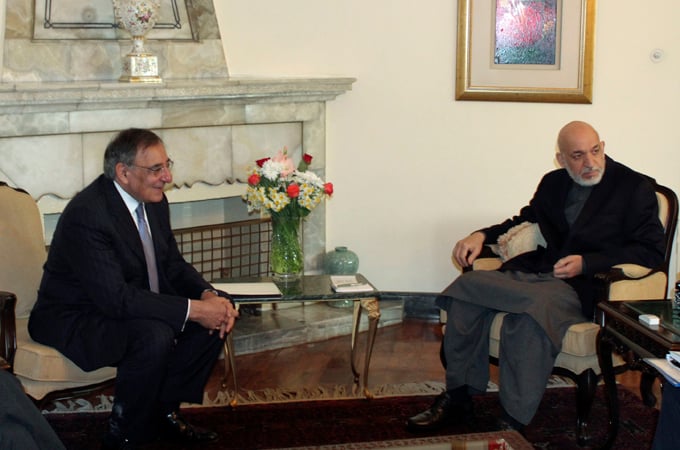
Afghanistan's President Hamid Karzai meets with Secretary of Defense Leon Panetta (REUTERS/Mohammad Ismail)
As promised, here are more of my thoughts on current happenings in Afghanistan and Iran. Yesterday I blogged about Afghanistan so this blog will focus on Iran. This past Sunday evening I was pleasantly surprised to see Meir Dagan, the former head of the Israeli Mossad their equivalent to the CIA, on CBS’ 60 Minutes. He spoke out against attacking Iran saying:
“An attack on Iran before you are exploring all other approaches is not the right way how to do it.”
Considering his past job this was quite remarkable. He was interviewed by Lesley Stahl who reminded the viewer:
“For nearly a decade buying more time was his job. The Iranians say Dagan dispatched assassins, faulty equipment and computer viruses to sabotage their nuclear program. All the while, he was poring over the most secret dossiers about the Iranian regime, gaining insights and a surprising appreciation.”
Dagan considers Iran a rational actor by their standards and seemed to feel the best course of action was supporting Iranian students and minorities. He also indicated the problem of destruction of Iran’s nuclear capability is more complex than most think. It’s been widely reported that Iran has 4 main nuclear related facilities but he says there are actually dozens. He also said if Iran were bombed:
“We are going to ignite, at least from my point of view, a regional war. And wars, you know how they start. You never know how you are ending it.”
The US Intelligence community is of the mind that Iran has the capability to build a nuclear weapon but doesn’t believe they have. Testifying before Congress on January 31, 2012, James Clapper the Director of National Intelligence stated:
“We assess Iran is keeping open the option to develop nuclear weapons, in part by developing various nuclear capabilities that better position it to produce such weapons, should it choose to do so.
We do not know, however, if Iran will eventually decide to build nuclear weapons… Iran’s technical advancement, particularly in uranium enrichment, strengthens our assessment that Iran has the scientific, technical, and industrial capacity to eventually produce nuclear weapons, making the central issue its political will to do so. These advancements contribute to our judgment that Iran is technically capable of producing enough highly enriched uranium for a weapon, if it so chooses.
We judge Iran would likely choose missile delivery as its preferred method of delivering a nuclear weapon. Iran already has the largest inventory of ballistic missiles in the Middle East, and it is expanding the scale, reach, and sophistication of its ballistic missile forces, many of which are inherently capable of carrying a nuclear payload.”
As I read the media reports on Iran in the last couple of weeks I felt like I was in the Twilight Zone and had been magically transported back to 2003. The articles seem very similar with talk of non cooperation with UN inspectors and accusations the Iranians are delaying inspections so they can hide what they are doing.
Here’s the bottom line for me, good intelligence can do a lot for you but very rarely are you going to have a 100% idea of what is going on in a particular situation. I’ve blogged before about how complex the intelligence analysis process. The latest statistic I have is every 5 minutes the US intelligence community collects enough data to fill the Library of
Congress. This is a huge problem. In the event the US and/or Israel did decide to bomb suspected nuclear facilities they may not be able to prove the Iranians actually had a weapon and thus risk even more problems.
I was interviewed many times before the 2003 Iraqi conflict. I was often asked would the Iraqis use WMD against UN troops. I said it depended on whether they wanted to win the battle or win the war. I said if I were the Iraqis I would not use them and any capability I had I would either destroy or send to some other nation to hide it for me. That way the US and its allies would look like idiots.
The Iraqis had set a precedent for moving military equipment out of their country. During the first Gulf War when it became apparent they could no longer maintain air superiority, they flew most of their remaining aircraft to Iran.
I’ve written before on the fact that the President and his staff have more information on national security related intelligence than the public is or in my opinion should be aware of. I think based on what I know diplomatic efforts and sanctions are the best course…for now. For more on this topic I recommend the blog Israel vs Iran Fight Breakdown by FPA blogger Scott Firsing.
As always my views are my own.